Audio and transcript from the January 13th, 2022 installment of “Conversations with the Coop” with Alex Salnikov, the Head of Product at Rarible.
To listen live on the next Conversations with the Coop - Follow Index Coop on Twitter and join the Index Coop Discord to get the real Owlpha.
Follow us on Spotify: Link here
RSS feed for Apple Podcasts: Link here
Crypto Texan: Hello, everyone. Welcome to Conversations with the Co-op. This is where we source questions from the Index Co-op community to gain insights from today's leaders in crypto and DeFi. I'm your host Crypto Texan, and on this episode we have Alex Salnikov, who is the Head of Product and co-founder of Rarible. Alex, thank you for being here with us today.
Alex: Thank you for inviting me over.
Crypto Texan: Yeah, absolutely. So we usually like to start these off with just giving us a little bit of your background and how you got into crypto.
Alex: That's a nice story. So, you can hear me alright?
Crypto Texan: Yes we can hear you just fine, absolutely.
Alex: Okay yeah, that's a fun story, actually. So I had been studying in the university, just like my first or second grade, and there was a project known back then that basically provided you with fiat on ramp and off ramp to crypto. Back then, like it was 2012 and me and my friend, we met together when I did some crazy viral project during my first year in university, and we decided, well, this sounds exciting, we should build something. That project earned like a million dollars in a year, and that was like an absolutely mind blowing sum of value for me back then.
And we thought we also want to have a million dollars, and by the way, let's read all that's out about crypto. So I dug up and I read the Bitcoin whitepaper, and it absolutely blew my mind. The notion of decentralization, interstate money, all of the things that we know that came from there. And I'm a technical person, and I had this instant realization in my mind that with that technology, I am the only person who can control my money. And I came from this country, which isn't really often... respects all the rights and stuff like that. That's why this specific idea of being sovereign about how you interact with your own funds with your own assets, it was very comforting that like, I knew that I'm an IT guy, I can write that script that will make a transaction. And even if I know, even if I lose my wallet, they can go to another wallet.
All these ideas, they've been just super fitting to me. I studied at one of the best economic universities, that's why I understood the tokenomics, the inflation, and just all the ideas landed super smoothly. And I basically never left the space. I almost haven't seen people who left this place actually, almost everyone who has joined this group never leaves.
Crypto Texan: Yeah, that's very true. So crypto was very interesting to you because not only do you have a technical coding IT background and a finance and economics background, but you also come from a country where the respect for, I guess, personal assets was not necessarily there. Which country was that exactly?
Alex: That's Russia. So just during the last 30, 40 years in Russia, there were a couple of minor reforms that basically denominated money, made all sorts of weird stuff with money and people generally don't trust banks in Russia. They go out and on the day of their paycheck, they cash it out completely because, oh, we don't trust this bank. Well, obviously it's not the same anymore, but still this idea of, oh yeah, I'd better do it myself. Yeah, it was really flourishing.
Crypto Texan: Yeah, that makes sense. And do you live in Russia now? Where is your hometown now?
Alex: Well, starting as of two days ago, it's the United States.
Crypto Texan: Wow, that's great news. So you'll be living in Miami full time?
Alex: Well, probably between Miami and New York.
Crypto Texan: Oh, that's exciting. Welcome to the states, Alex. That's good news. So what, I guess going back to Russia like, what is the general sentiment of cryptocurrency and DeFi and NFTs in Russia?
Alex: It's a very interesting question. So I think that the general sentiment is the following. So first of all, an Ex-Soviet Union country has just a brilliant IT industry and universities, schools just one of the best in the world. Maybe even the best, people study mathematics, physics all the time. That's why all sorts of IT guys, they absolutely love crypto because it's almost like the technocratic wing of IT guys over the finance guys right. Now we are doing finance, not you – that's what IT guys think.
And overall, this makes this whole thing very, very appealing to the whole IT crowd. On the other hand, there are a lot of regulatory issues and the country has always been strict on controlling flows of capital. You can't just send the money abroad and from abroad. That's why there has always been this tension of, okay, what can we do? So as for now, it is allowed to hold assets, transfer assets, but not exchange them inside the country and not to use as legal tender.
Crypto Texan: Wow yeah, and you've got a really fascinating background, Alex, and thanks for sharing all that. So I guess my next question is, let's talk about Rarible and just explain for our audience, for those who might not be familiar, know what is Rarible and what does the Rarible Protocol do?
Alex: Okay, so Rarible started a little bit more than two years ago, and on the idea stage exactly 2.5 years ago. So during all this time being in crypto, I've been mostly doing financial projects, doing exchange or a trading role. But we did marvelous technical pieces like a million trades per second matching engine written in some low level programming language that allows you to do short sales and leverages. So this concept of liquidity and stuff like that is super familiar for me.
And we've been always doing that, and at some point we thought, why are we doing all that boring stuff? It's like 0.1 percent APY. And was this something fun? And basically, what was fun back then was NFTs, right? It was 2019, not a lot of people were still in the NFT space, but what I realized is that every wallet had NFT support, right? Trust Wallet, MetaMask, it was always this type of collectibles, which was kind of empty and in every wallet and a lot of infrastructure was built, marketplaces and I saw that, well, NFTs are really consumer friendly because like, yvBTC-CRV pool, right - how do you explain that to somebody?
While NFTs are okay, it's just an item. You have it in your wallet just like a card. Look at it, it's like right here, plain and simple. Also, like in 2017 and 2018, it was still a little bit hard to use blockchain. And I don't know if you remember the Mist Wallet where you needed to download 200 gigabytes of data to your computer to use the smart contract, stuff like that. So that's how– sorry for the long intro, but that's how Rarible was born. Basically, we thought, okay, there is a lot of infrastructure, but there is not so many NFTs and we came up with a platform that allows you to create NFTs and brought this like free spirit more or less with us because being that many years in the space, it's kind of in the DNA.
So there were a couple of platforms like SuperRare back then, but you needed to verify yourself right to start creating NFTs. So we thought, why don't we just allow it to anyone? So we came up with just a simple form, upload your picture, name, and description and connect your wallet and hit the mint button. And also, of course, let's assign a price now, and there was just a simple one page feed that you can still see on Rarible if you scroll down everything right? There was just one simple feed without any filters - here's all the items that are on sale.
And so at first we were basically mostly a minting platform, and then over time we evolved into a full featured marketplace. We indexed all NFTs that exist on Ethereum, every collection, every NFT, made them available for sale. We introduced royalties. We introduced filters, introduced refresh, leaderboards, stuff like that. So basically evolved into the full feature secondary marketplace.
And then we, and that was basically maybe 1.5 years after we all started. And then we thought, okay, we spend that much time to actually create something useful, something meaningful, a marketplace, and we see a lot of other people are doing their own NFT projects. And it's really hard– you need to build an indexer, you need to build the smart contract. That's why we took these two parts – the smart contract layer and the indexing layer, and we spun them off of the marketplace into its own separate product, Rarible Protocol that you can build an NFT project on top of.
So it's basically the infrastructure that would allow you to create your own NFT marketplace in like two or three months instead of two years, right? Well, that obviously depends on where it goes – if you want to sell any NFT, you need the full Ethereum indexer, that would be fairly hard. And also we realized at some point– we launched the token, the governance token on the platform, and we realized that at some point that it's actually quite hard to govern the frontend business. And that's why we separated a protocol and made it neutral.
So there’s very little things that you can actually change on the protocol in terms of, like, the protocol shows every NFT without the blacklist feature that we have on the front end. So it's like a very, very neutral, open source infrastructure layer that is built with all these community principles day zero, right? Open source, smart contract, community governance and a complete set of crypto rules that we all know and follow. That was a long answer.
Crypto Texan: No, it was a great answer, thank you very much. And I feel like, you know, when you're in the crypto space, especially two and a half years ago when you started Rarible, it takes a lot of conviction to take an idea and put forth a lot of your time, effort and resources into creating a protocol just based off the idea. But you were able to do that with other co-founders. And I'm just curious to what was the relationship that you had with your other co-founders prior to founding Rarible? Like, where did y'all meet, how to y'all interact? What is that relationship like today?
Alex: Oh, thank you for questioning that, I always love personal questions. They sometimes feel deeper than technical. So there were like more or less four people at the start of this whole idea. There was me, Alexei, the CEO of Rarible, Eugene, the CTO, and Ilya, the head of design. So four of us were just sitting in a café in the summer, a Chinese cuisine café and we came up with that idea.
So prior to that, we met with Alexei in 2017 during the bull market when everyone was doing their own ERC-20 tokens and we collaborated on the platform that allows you to issue ERC-20 tokens. And so for everyone who wants to issue tokens, you can kind of feel the rhyme with the NFT issuance. And I was just amazed by the technology level that the guys brought. It was super reliable and super cheap actually at the developing cost. And the guys even wrote some parts of the smart contracts in assembler, in some very, very low level language that allowed them to optimize it heavily. So I was just blown away by the technical level. And basically since then, we just kept talking with Alexei about, oh what about this in space, what about this in space? And eventually that ended up being a project together.
While with Ilya, we were working for several years before he was doing all the designs for all the projects that I did in crypto for almost like five years after we met with him. He previously worked at Yandex. It's like a big Russian tech company, big tech in Russia, basically Google. He shipped projects to tens of millions of people on his job. So he's a really, really talented designer. The first time he created the logo for us and I fell in love with everything that he does.
And the CTO, Eugene, he worked with Alexei for probably 10 years before, so it was kind of like me and Ilya and Alexei and Eugene joined forces. Eugene is like a brilliant physician, he represented his country in the world physics contest, and Alexei studied physics at school, and actually received one of the top marks on the state exam on physics. So I don't know, it kind of felt the same vibe together, and our relationship is just perfect now. We are all enjoying this and this is super fun.
Crypto Texan: Yeah, I just think it's interesting to hear what the relationship was like, you know, prior to the founding of protocols. And, you know, just kind of how all that formed and came together. But I think it's fair to say that especially compared to the rest of the general NFT market, that you were pretty early to NFTs. And so I'm curious too, why did you have this conviction in NFTs so early on? And what was your first NFT to purchase?
Alex: My first NFT to purchase? So my first thing, it's still my wallet, actually. You hardly can say that it's a real NFT, but that's actually partially related to why I had this conviction. So when we brainstormed an idea about the NFT issuance and the marketplace tool, we all came home and we created a couple NFTs just without minting tools and Ilya, the head of design, he created a beautiful NFT of a skateboard deck that had an AR symbol on it.
So you can, like, point your phone on it and it would show you something, I don't remember what. And so it basically felt like a very tangible thing. This is a skateboard deck, it has really, really solid strokes around it. So you almost feel like this is an item that belongs to you, like a physical sense of ownership when you have it in your wallet. And he created that, he sold it to me and I sold it back to him, and he sold it back to me, and the mere joy and fun of this process, it was tangible how emotionally cool and fun and sticky that is. So basically we flipped NFTs and we loved it, and that's why we built the platform.
Crypto Texan: That's really cool. Yeah, that makes sense. And so your role, Alex, at Rarible is the head of product. Can you give us a little background into what it means to be the head of product at Rarible? And just kind of what your day to day looks like?
Alex: My day to day is like heavily changing actually over these two years. So first I was just head of product and the only product manager on the team. And for the first whole year of the Rarible experience, I was basically the person who worked with the set of engineers and I was constantly on Twitter. I was researching this phase, okay what should we do, talking to the users, talking to the community, okay guys just pour all the feedback into me and we will build something cool for you. So getting the user feedback, digesting it and coming up with the idea to get what are the future that we should build and then managing the team to actually build them.
Managing the team of engineers is mostly, okay we have a daily call, right? We will all go to this call, we discuss things, and then the next day with what we have built, and every week, there is a plan. So it's a fairly standard process. I'm pretty sure a lot of you know that if you ever been in the engineering company or done some projects yourself. So that was my day to day job for a long time, and I really enjoyed that.
And then we basically scaled that. So we went from one product team to six product teams, and more or less now you can only start to see the results of that stuff. So all the first half of 2021 we spent on scaling the team, we have a lot of engineers, a lot of product managers now, and being head of product means mostly interacting with product managers and lately my role changed again. So we welcomed Nass Diba, the VP Product, from Aave who previously worked at Dharma as a really senior manager, to work with the other product managers. So mostly what I've been doing now is researching and setting up the strategy – what would be a good idea to build because I'm still constantly on Twitter, talking to people, talking to the guys, and understanding what we should do.
Crypto Texan: Yeah, and is some of the feedback that you're getting from the community DAO related? Because I know we have the Rarible Protocol and we've got the interface that sits on top of it and then you've got the token as well. But is there a DAO for the Rarible Protocol? And are there any plans of going through DAOification?
Alex Oh yeah, there is a DAO of the protocol and there is a separate Twitter handle. You can find it on Twitter, it's like @raribledao. It's a really vibrant community of like 2,000 people that are doing marketing, that are doing business development, that are making grants to people who build on top of the protocol. So it's a very, very nascent and innovative group of people. We feel like the DAO currently today is like, you know, Google X. There are a lot of innovative people, a lot of young and hungry minds that are just crunching ideas and stuff like that.
Crypto Texan: Okay, and what are in your mind some of the major hurdles that you have experienced, the DAO has experienced by just having a DAO in general? I guess like from an organizational structure standpoint or just the ability to get things done, what are some of the struggles that y'all have experienced personally?
Alex Well so the DAO is the first experience that we had with DAOs, initially when we just launched all this. So there was a lot of activity in DAO from the creator side and the instant feedback and experience was, okay it is really, really hard to try to align everyone on some difficult economics rules or something like that, so people don't really want to vote. And sometimes when they vote, it's like not a very opinionated vote. That's why we started to restructure this all, moving the DAO and token mostly to the protocol side, not to the creator and marketplace front end side.
And then there was this understanding that, okay it's too hard to actually employ people into the DAO. A lot of them need some benefits, that they want to be employed officially at some company, and DAOs rarely can do that. And when they are employed, they need to vote on their employment. And a lot of people feel insecure about this when that happens with the vote, rather than like with some interview process.
And scaling the DAO and bringing really, really experienced people is really hard. In DAOs we feel like there is a lot of fresh energy, a lot of young people, and most of them are almost seeking their first or second or third job opportunity in the DAO because they feel like this is the future of organizations. So if you try to scale the organization and you need to hire some very senior managers, a lot of them are like, require more and more benefits and feel a little bit unstructured and weird when they operate in the DAO environment.
Basically, DAOs for today are really good if you need to make some democratic investment decisions like what should be in the index or where we should invest, while just actually delivering a product is still much harder in the DAO environment, just in the traditional way that centralized, centrally managed style organization. You have a manager that tries to manage the effectiveness of the company, put tasks, enjoy accountability, embrace accountability and stuff like that. So that was fairly unstructured, but I know maybe some of that resonated.
Crypto Texan: No yeah, it definitely resonated. And you know, I think DAOs are such a new and nascent type of way to organize labor and organize human coordination that, you know, I think it's just natural that we're going to run into issues like that. We've obviously run into our own issues at the Index Co-op. I say obviously, because everyone obviously runs into their own type of scaling issues when it comes from talent management organization coordination, cooperation from a DAO. But I'm curious about, so Alex what about you and your co-founders as far as a compensation standpoint? So are y'all compensated by the DAO or are you compensated from an organization that manages the front end?
Alex: We are compensated from the organization that manages the front end.
Crypto Texan: Okay, I was just curious about that. And so what is the main driver for the Rarible DAO's treasury and the Rarible organization who manages the front end's treasury as well? Like, how does the Rarible Protocol make money and distribute that to, I guess, the stakeholders?
Alex: Well, this is a very, very good question. So one of the best things about the protocol is, and one of the most innovative things that I personally just love that we did, is the fact that when you run the front end that works on top of the protocol, you are actually adding your own front end fees on top of the protocol fees. So there is some baseline protocol fee, which is currently zero. And the protocol empowers the front end that runs on top of that. So whoever brings the listing or the buyer to the protocol, they add their own fee to the order.
So imagine that you run a minting service through which people are creating NFTs and put them on sale, something like Koko NFT does, and then somebody else-- and it's working on top of the protocol, and somebody else is running the storefront business when they curate top 10 collections or artists every day and present them in a curated way on their own website so that people who come there and know that this is the quality projects. So if this second business would curate something that the first business, that your business created to the protocol, then both of these businesses would receive front end fees. One of them would receive front end fees for bringing the sale, the listing, and another one would receive the front end fee for bringing in the buyer.
So there is a shared order book. Everyone is looking in the same space of listings and purchase tests. You can filter that the way you want and whoever you brought to the same space, you got the fees from that. So that might hint to you how this all is set up. So the current DAO Treasury consists of $RARI only. So the protocol does not generate fees at the moment and DAO is distributing this $RARI treasury to people who build on top of the protocol just to incentivize people, to align them into the common governance model. And front end earn fees and Rarible (dot) com is one of the customers of the protocol, actually, and it has no preferences. It's an equal customer as anybody else charges its own front end fees to its own private corporation.
Crypto Texan: Okay, yeah, that's actually very helpful, yeah. And so what, I mean, how does Rarible differentiate itself from the competition? There seems to be a lot of competition popping up recently. And what in your mind sets Rarible apart from the rest of the crowd?
Alex: Well, obviously the first part is that we are not only a marketplace, but we are a marketplace and protocol, which is highly attractive for developers. And we have a token which makes the community really a stakeholder in this whole stuff. And that's why the community is really incentivized to send people to Rarible, like if among all the other things, equal, right? If it doesn't matter where you want to trade, you want to trade where your bags are. And recently, we just implemented this OpenSea orders mirroring. So whenever you come to Rarible you can actually see anything that's available both on Rarible and OpenSea. So you have all the same supply, even better, even bigger - you have both Rarible and Opensea supply.
And the second point would be that we are multichain. We are the first marketplace that actually went to multiple L1s. We support Flow and Tezos blockchains, and soon we will add Solana and Polygon, this has already been announced, they're working on it. So it's a kind of one stop shop for everyone in NFTs. At first, you come, you create your own NFT, then you get bigger on the marketplace, you start trading and flipping, and then you grow and you create your own project based on Rarible Protocol. Obviously Rarible Protocol on Flow, and then Tezos is also available for developers to build on top. Yes, and this same will be for other chains.
So imagine this is kind of, okay there are a ton of NFTs everywhere across different chains, across different marketplaces, and you can find them all on Rarible under one umbrella and they're one unified thing. And the biggest and best part of that is that community is at stake. You can realize it's not like just you pumping someone else's stuff when you use it.
Crypto Texan: Okay, and when you're bringing in the orders, I guess what's available for sale on OpenSea, that kind of seems like you're taking on an NFT aggregator role. So I guess my next question is, do you plan on implementing any other protocols like, I know NFTX? Maybe you could query their NFT vaults that they have? Are there any plans to do that?
Alex: Oh yeah, actually interesting. So the next one in the pipeline would be probably integrating CryptoPunks marketplace orders to Rarible, just out of the whole due respect to the OG community, right. And I very much love this idea about integrating NFTX. So yeah, you're right, it is sort of an aggregation strategy in addition to the marketplace strategy.
Crypto Texan: Right because I was playing around the other day and I got on the Genie XYZ protocol just to see what it was like. And I noticed that it was not only pulling OpenSea, but it was also pulling NFTX. And I kind of just had this "aha" moment about NFT aggregators and what that future could potentially look like. So I was just wondering what y'alls plans were for implementing other things like that.
But I also want to talk about OpenSea a little bit more, obviously, because it is your main competitor as Rarible. What are your views on OpenSea in general? What is OpenSea doing right and what are some of the major shortfalls that you feel like users have with interacting with OpenSea?
Alex: Yeah so OpenSea are great guys. They've been around in this space for longer than anyone else. They actually created that infrastructure that was there that allowed every wallet to have this collectible tab, like half of the wallets use their API. And I think the main– so kudos to the team. They are like, absolutely made a lot of effort and spent a lot of time out of their lives to make NFTs a real thing. So we respect the team completely.
And obviously, what they are doing right is doing all that, keeping the liquidity of the marketplace big, making these discovery efforts, like all these collectibles. We were relatively late to the party, to the PFP trend. We were mostly like, okay art as a marketplace of art based on individual creators, while the collectibles being like the OpenSea bread for several years. All these things as for, like reveal the metadata, refresh the metadata field, order by trade, all that stuff was basically invented by OpenSea, and they did, right.
So one of the biggest downsides of all that is they are a fairly centralized company. And it's like the Coinbase model, you don't have the custody of the funds. Of course, they don't custody the funds and that's a step away from the Binance, Coinbase models. But overall, it's still a quite centralized company and very, very much not community based. And maybe a little bit slow too, lately and since they have so much like responsibility to actually support everything that they've already done, so it's not that we see a lot of stuff there.
They promised multichain like Tezos maybe a year ago, we were able to to get there, they weren't. So I think they're doing a lot of things right. And obviously, some of the things are not super great. One of the latest examples would be these orders, when we started to pull up OpenSea orders, there was a big drama on Twitter that some people were able to buy assets below the floor price. That's because some of the orders weren't actually canceled on-chain, they're just hidden from the front end. So stuff like that maybe shows that the guys are really underwater with supporting all the great things that they've done.
Crypto Texan: Yeah, I remember hearing about that drama on Twitter as well. And yeah, that's unfortunate. But yeah, I mean, I think that's also part of not being open sourced, you know, with your protocol because if you're open sourced, you can see everything on chain and all bugs can be found with the more eyes that are on the open source protocol, which is where I think y'all benefit there as well. And you know, we've talked about other side chains, but what about layer two like Arbitrum, Optimism, zkSync, Starkware? Where does the future lie, what does the future look like for Rarible on the layer two front?
Alex: So we've researched a lot of information about layer twos just a while ago, actually maybe 1.5 years ago. And surprisingly, there are much more NFTs in layer ones than in layer twos. Once the layer twos are targeting like DeFi applications, so Arbitrum, Optimism what you would see there would be mostly DeFi apps and every-- so the Arbitrum, Optimism, and Phantom, I guess they are all optimistic rollups and the technology itself relies on these watchtowers that they need to monitor the situation when you withdraw funds from this rollup. And that architecturally imposes some limitations that you need to wait for, like seven days until you can withdraw the asset or any other long period of time. So not nearly instant.
I feel like this is a big downside for NFTs specifically because for DeFi, you can actually not wait seven days, but somebody can use it and you can act as a liquidity provider and that person can give you his own money and wait for seven days himself instead of you waiting. That's always not possible with NFTs, there's only one NFT of that kind. Somebody can only give you his NFT while he waits for your NFT to come. So I'm not sure, although on the other hand, somebody can argue that you don't really want to move NFTs really often from layer two to layer one. They will mostly leave inside layer two.
So layer two, generally not there yet. The only one that is there in terms of NFTs is Polygon, which we're integrating, and I'm super, super curious about ZK-rollups which is actually like the next technology that will come after optimistic rollups. The Starkware team, StarkNet, zkSync team are doing a great job in this realm. So it's still early for layer twos, but we're constantly looking at that.
Crypto Texan: Right, because I think that there are a lot of people in the space who foresee a future where possibly Ethereum is mainly just a settlement chain for L2s in sidechains. And I think a lot of people are starting to speculate and figure out, you know, what does that mean for NFTs that are on mainnet, that are on the layer one? If the base layer mainnet does become too gas intensive for regular retail users to operate, what happens to the NFTs that are on layer ones?
And that's kind of why I was getting at that layer two question is, you know, is there a way to move those from mainnet up to a layer two to make the gas fee less intensive because I feel like NFTs are a very retail centric product where, you know, if you have DeFi protocols on mainnet, probably not as bad, right? You can use institutions or major whales or players using that. But for NFTs, it's a little different. Now what are your thoughts on all that?
Alex: Well, of course, you can move NFTs from layer one to layer two to chip in the gas prices, they would get locked on the layer one. They would be minted as new NFTs on layer two. You can do that today with Polygon. You can move your CryptoPunks to Polygon and enjoy the almost nearly zero fees on transacting inside Polygon. And then you can move it back and you will get your own CryptoPunks back. That's already possible, and that's what will happen with NFTs really, if Ethereum becomes too expensive and too gas heavy.
Now we are coming to this Ethereum 2.0 stage when Ethereum is making more and more progress and probably will even deploy the beacon and chain with cross-chain environments until 2022, right. So the merge can happen until 2022 - well until the end of the year 2022. And that will simplify things because you won't spend money on mining anymore, right? So eventually, I think the gas prices long term on Ethereum will be relatively as they are now. So maybe they won't get too much more expensive than this, Ethereum will optimize, and that's why the throughput will rise. And on the side chains it will be lower, but on the mainnet that it will be the same. That would be my bet.
Crypto Texan: Okay, another question I have is just what are some exciting developments and trends that you are seeing in the NFT space? I know play-to-earn is very big right now, music NFTs are starting to come into their own, photography, ticketing for concerts and events, more PFPs, PFPs will never end apparently. What's exciting to you on the horizon?
Alex: It's a very, very good question. So what's personally exciting to me is actually this whole concept of composability. We achieved something incredible in the DeFi space. You can take a million dollars worth of loan in seconds, right? If you have appreciated assets, if you have assets that are appraised, if somebody knows how much your asset costs, you can get the loan against it in seconds. So the fractionalization, the financialization of NFTs, for example, the purchase finance.
So imagine a mortgage for Bored Apes. You can't buy your Bored Ape now, but what you can do, you can make a down payment. And then this Bored Ape would be held in custody and you would pay some small amount of money for 10 years for this Bored Ape. And then it will become yours. And meanwhile, you can use it as your PFP on Twitter. How awesome is that?
And then at some point in time, we can connect real world assets. So once we solve this like legal issues and you can represent your house as an NFT, you would be able to take a mortgage for your house in seconds rather than in weeks as it works now. So something like that is really fascinating to me. This is like real deep development in innovation, allowing insurance's automation of capital in regards with the NFT. And the biggest thing that we need to do is to find a way to price NFTs. So as soon as we can price an NFT on a chain, there can be an explosion of all these financial instruments. This is very exciting.
And on the other hand, in the traditional world, I think what's exciting to me is just the notion of we all buy a lot of physical items and a lot of these physical items, they don't have any physical utility. They are mostly like intellectual utility. Imagine you bought a Star Wars toy for your children. They don't have to be physical at all, they can be purely digital. So digital fashion, digital toys, digital goods, just converting half of the current e-commerce into the digital e-commerce, which is truly independent and open and neutral, is another big thing that fascinates me.
Crypto Texan: Yeah, that's really exciting. I'm also curious as to what other protocols outside of the Rarible ecosystem, from a metaverse standpoint what other protocols and projects have you been paying attention to that's catching your eye lately. Or in DeFi protocols too, for that matter, if you have some of those as well.
Alex: Yeah so the purchase finance protocols, the NFT lending and borrowing Union protocol is a nice one. There is Upshot, it's an NFT pricing protocol. So stuff like that really is something that I keep following. And on the other hand, in DeFi, I think we are coming to this moment when all the giant protocols like Aave and Compound are actually becoming institutional, almost like governing great big projects when the large institution can go there and borrow money. So like 26 billion dollars TVL on Aave. Aave Arc, that is like a more centralized version, corporate version of Aave. I think this is just, I know we've all been dreaming about that in 2011 and the coin just started, we've been dreaming about making it legal tender. We've been dreaming about governments adopting bitcoin, putting that in the balance sheet. And I'm just really fascinated how fast this happens after like 2017, when there were empty grounds on all of these realms.
Crypto Texan: Are you still there, Alex?
Alex: Yep, yep, I'm still here. You still hear me? Maybe I cut it off a little.
Crypto Texan: Yeah, I think you might have cut off a little, but that's ok. Yeah, I completely agree with you. Yeah, I think it's really interesting to see the strides that both Compound and Aave have been able to make with Aave Arc and Compound Treasury. And it's going to be very interesting to see how those two products that are getting developed evolve over time and interesting to see, you know, which institutions are actually going to be using those DeFi protocols. The KYC-ed DeFi, which kind of do you not feel like that kind of goes against the ethos of crypto in a way?
Alex: I don't think at all, actually. So the ethos of crypto is decentralization, and I don't think it's necessarily against interacting with the government. So if the United States, China, and all the sovereign countries that we have in the world would all interact with the same blockchain, right? With Bitcoin, for example, it would be the perfect decentralization because the same concepts of game theory would apply. None of them can cheat the other and it works at any rate like that.
And I have been thinking about it for a while, actually. And that might be an unpopular position, but I feel like the real innovation in blockchain happened, like there are two core things. The first one was actually getting a wallet into the user's hands. And what that means is that every user that uses blockchain now has a digital signature. The true– and digital signature is called one of the greatest inventions of the 21st– probably not 21st, probably 20th century, right in mathematics. So you give a digital signature into every person's hands, and then the blockchain is merely a database that stores these digital signatures in a consistent way.
So even if you imagine if you keep all the same systems as they work today, but you put them on a blockchain, you put court on the blockchain, you put banks on the blockchain, you put compliance on the blockchain, but would just make this utilizing digital signature. If somebody needs to sign in court to release your funds, then the system will still be much, much better than they exist now. Even if we keep all the same things, it does go without saying that we will innovate and create better systems. So even if we keep the current system, it will be even better. Not sure if that's clear.
Crypto Texan: No, I completely agree with you, Alex, and that's just a question that I ask because, you know, you kind of just see people on Twitter say things that are related to Aave Arc and Compound Treasury. So it's just kind of good to get other people's thoughts on that when they're not just trying to, you know, tweet to get interactions from people.
Yeah, so we're running up on time. I got a few more questions left for you, Alex. So at Index Co-op we have a product called the Metaverse Index. I'm sure you're familiar with it. And the $RARI token is included in the Metaverse Index. Well first of all, I'll ask, do you own any $MVI, the Metaverse token? And regardless, what protocols would you like to see included in the Metaverse Index that aren't already?
Alex: Oh, it's a very, very good question. First of all, I probably do not own any Metaverse Index and that's a pity. I'm a big fan of DPI, actually. Whenever any of my friends just ask where I should put my money in crypto if I don't know anything, like five years ago I was answering bitcoin. Two years ago, I was answering Ethereum. Now I'm answering DPI. It's a very, very big and exciting thing. So Metaverse would probably be my next year's answer to every one of my friends that don't know where to put their money in a more or less like a safe way.
As for the projects, it's surprising that not many metaverses have their tokens. I don't even know why, obviously NFT marketplaces are the big stuff in the metaverse, like Decentraland or I'm a huge fan of digital land. That was one of my best, my best flips, actually. The CryptoVox digital land and I think every metaverse that has the native token should be there. And personally, I think maybe, maybe there will be a time when you will be able to make NFTs part of that index.
Crypto Texan: Yeah, that's one of the things that we're working on. And I think the methodologist for that index is Joseph and he was in here earlier, I don't know if he's still there. But we're working on what we're calling the JPEG Index, and kind of leveraging the technology of Nifty Museum and NFTX right, because that kind of creates liquidity pools for these basically illiquid assets that are NFTs.
And so we're working through the engineering constraints on that. There's issues related to slippage that kind of come into play, too. But that is something that we are working on from an engineering standpoint and plan on releasing sometime this year. So we're really looking forward to that. That's one of the products that I'm most excited about in the Index Coop's pipeline for this year. So, yeah, it looks like we're pretty much up on time here, Alex. So I'll just give you the final word, the call to action. Where can people go to find out more about you and Rarible?
Alex: Follow me on Twitter, of course, it's my personal page, @insider0x. And of course, @rarible and @raribledao would be handles that you want to follow on Twitter as well. I'm mostly active there on Twitter, and my call to action would be just, you know, do hard things and have fun. That's a very fulfilling type of living, when you do hard things and have fun.
Crypto Texan: I think that's great advice, and thanks again, Alex, for coming on the show. Thanks to everyone who's listening live in the Discord. This is being recorded, so we'll ship this off to get a transcript and get it mixed by my audio engineer. And we'll see y'all next week. Have a good weekend. Thanks again for coming on, Alex.
Alex: Thank you so much.
Crypto Texan: Alright, bye.
Alex: Bye.
Host: @Crypto_Texan
Audio Engineer/Mixing: @LloveraFrank
Marketing Image: @crypto_diller_
Transcript: @qjuniperus




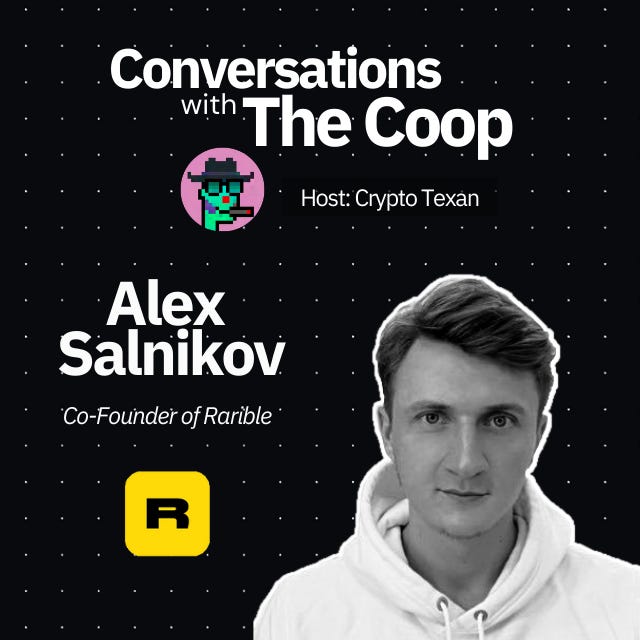



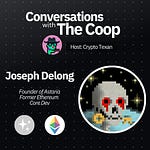

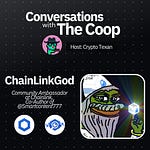
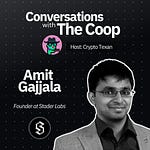

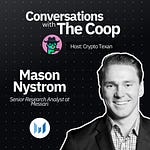
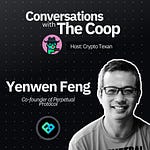
Conversations with the Coop - Alex Salnikov - Rarible